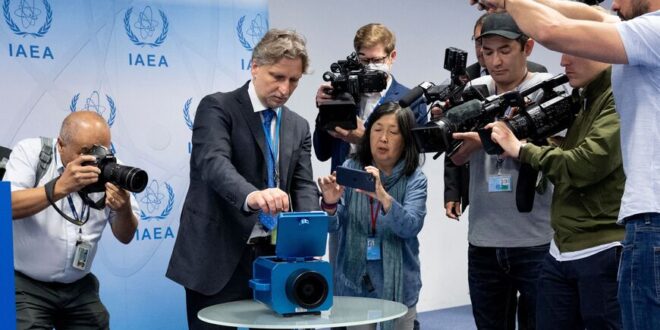As it reviews the latest US response about returning to the 2015 nuclear deal, Iran is refuting the International Atomic Energy Agency’s claims about its previous nuclear activities.
Iran said Wednesday it had received a US response on its latest proposal as part of efforts to revive the nuclear deal.
“This evening Iran received, through the [European Union] coordinator, the US response to Iran’s comments. The careful study of the views of the American side has started and Iran will share its comments with the coordinator upon completion of the review,” Iranian Foreign Ministry spokesman Nasser Kanaani said in a statement.
Earlier in the day while Tehran was awaiting the response, the head of Iran’s Atomic Energy Agency pushed back against the United Nations’ nuclear watchdog.
At a press conference today, Mohammad Islami said, “From the beginning, Iran’s nuclear activities have been [in compliance with] the International Atomic Energy Agency’s guidelines and regulations.” He added that all of Iran’s nuclear activities have been “under IAEA supervision.”
Islami added that claims that Iran’s nuclear program have not always been transparent and peaceful have come from Israel and foreign-based opposition groups. He continued that in 2015, when Iran signed the Joint Comprehensive Plan of Action (JCPOA), the old accusations against Iran were dropped. According to many analysts including a US intelligence report, Iran stopped work on nuclear weapons in 2003 for various political, economic and technological reasons, while continuing to acquire expertise and technology in the field.
It is not clear exactly what prompted Islami’s comments today. In an interview with PBS published yesterday, IAEA chief Rafael Grossi said that the agency needs “maximum levels of cooperation.” In June, as part of its measures to pull away from the requirements of the JCPOA, Iran removed 27 cameras belonging to the IAEA.
When asked about the IAEA finding nuclear material at an undeclared site and whether Iran has given an adequate explanation, Grossi replied, “Not yet.” Asked if the IAEA needs a sufficient explanation before the deal can be revived, Grossi deflected.
One of Iran’s current concerns is that even if the deal is revived, the United States would use previous claims against Iran to not implement its end of the agreement. Tasnim News Agency had reported on the “delay” in the US response, saying that the Biden administration has a “love-hate” relationship with the nuclear deal and that it wants to revive the deal but every time the two sides are close to an agreement, they pull away.
In the latest round of talks, the European Union gave Iran what it called its “final offer” to revive the 2015 deal. Iran then submitted its proposal and is now awaiting the US response.
According to many Western news outlets, Iran has stepped back from some of the main sticking points that were preventing the implementation of the deal. One of them was the sanctions on the Islamic Revolutionary Guard Corps. Former President Donald Trump had put the IRGC on the list of Foreign Terrorist Organizations after withdrawing from the nuclear deal in 2018. According to reports, Iran has agreed to remove this issue from JCPOA talks, though it is likely Iranian officials will bring it up in subsequent negotiations over other matters.
 Eurasia Press & News
Eurasia Press & News




